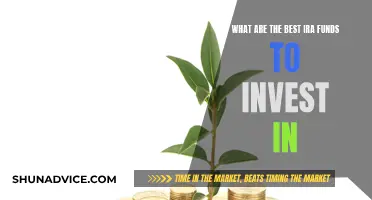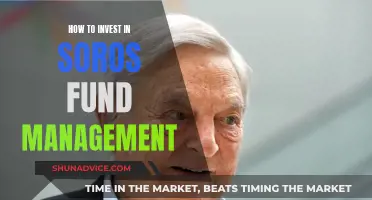
The ultra-wealthy, or ultra-high-net-worth individuals (UHNWIs), are a group of people with net worths of at least $30 million. While it may seem that these individuals have access to some secret investment strategy, this is often not the case. Instead, they tend to understand the basics of having their money work for them and know how to take calculated risks. UHNWIs invest in a variety of areas, including real estate, private equity, venture capital, commercial property, stocks, and luxury items. They also tend to have good financial habits, such as not overspending, utilizing rewards credit cards, paying themselves first, maintaining an emergency fund, and being strategic about carrying debt.
What You'll Learn

Private equity and venture capital
Private equity (PE) refers to stock in a private company that is not offered to the general public but instead to specialised investment funds and limited partnerships. These investors then gain control of the company and delist it from public stock exchanges. Private equity firms usually invest $100 million or more in a single company, buying mature companies outright and streamlining operations to increase revenues.
Venture capital (VC) is a subcategory of private equity, which refers to equity investments made in less mature companies, often startups or small businesses with high growth potential. Venture capital firms typically invest $10 million or less in each company, as they are dealing with startups with unpredictable chances of failure or success.
Both private equity and venture capital firms raise external capital from investors, known as limited partners (LPs), who can include university endowments, sovereign wealth funds and high-net-worth individuals. However, venture capital falls under the private equity umbrella, and practitioners will sometimes refer to an early-stage investment in a startup as a private equity investment.
The investment criteria for private equity firms are usually established, mature companies with a track record of sustained profitability, even during recessions or unfavourable economic conditions. Private equity firms rely on debt financing as a core driver of returns, with acquisitions often funded by a substantial percentage of debt.
Venture capital firms, on the other hand, rarely use debt financing, and their investment criteria focus on growth and the potential to disrupt a traditional market. They look for high revenue growth, strong management teams, innovative product offerings and the potential to disrupt an existing market.
Both private equity and venture capital are viable options for wealthy investors, depending on their risk appetite, investment goals and the amount of capital they have available.
Index Funds: Direct Investing Without a Broker
You may want to see also

Commercial property funds
There are two main types of commercial property funds: direct and indirect. Direct funds, also known as 'bricks-and-mortar' funds, involve the fund manager buying physical properties. Risk is spread across several properties, so if one is unoccupied, others can still generate income through rent. Returns come from a combination of increased property value and rental income. However, direct funds can be illiquid and hard to buy and sell, and there is a risk of the fund being frozen if property values drop.
Indirect funds, on the other hand, invest in shares of property-related companies, particularly Real Estate Investment Trusts (REITs). REITs own and operate a variety of properties and are managed by experts. They are traded like stocks and must pay out 90% of their taxable income in dividends. Returns are gained through share price appreciation and dividend income. Indirect funds offer more liquidity than direct funds, but they are also more volatile as they are traded on the stock market.
When investing in commercial property funds, it's important to remember that the performance of these funds is closely tied to the economy. In good economic times, demand for property increases, pushing up rents and property prices. However, during slowdowns or recessions, the opposite occurs, and vacancy rates may rise.
Smaller Companies, Bigger Returns: Investing in Franklin India's Future
You may want to see also

Luxury items
Art
Art is a popular investment choice for the wealthy, with auction houses reporting record-breaking sales. In 2022, Andy Warhol's "Shot Sage Blue Marilyn" sold for $195 million at Christie's in New York, becoming the second most expensive piece of artwork ever sold at auction. The art market saw a 29% price increase in 2022, the highest across luxury items.
Classic Cars
While most cars lose value over time, collectible cars gain value. In 2022, a 1955 Mercedes-Benz Uhlenhaut Coupé sold at auction for a record €135 million ($143 million) to a private collector. Classic cars are rarely affected by downturns in the market, and their value often increases with repair and refurbishment.
Luxury Watches
Vintage watches are another key investment area for the wealthy. Patek Philippe watches, considered the "holy grail" of timepieces, consistently command prices of over £1 million. In 2019, a Patek Philippe Grandmaster Chime in steel sold for $31 million, becoming the most valuable watch ever sold at auction. Rolex is also a popular investment brand, with a basic Submariner costing about $7,500 and certain models reaching much higher prices.
Designer Handbags
Handbags by luxury fashion houses such as Hermès, Chanel, and Louis Vuitton are highly sought-after investment pieces. The exclusive and limited availability of certain bags, such as the Hermès Himalayan Birkin bag, drives up their value. In 2016, a Hermès Himalayan Birkin bag with white gold and diamond trim sold for $372,600.
Wine and Whisky
Fine wine and whisky are also popular investment choices, with whisky seeing a 373% growth over the past decade. In 2022, a rare 81-year-old bottle of Macallan whisky sold at auction for £300,000, nearly triple its estimated price. Wine saw a 10% growth in 2022, outperforming spirits, coins, jewellery, and coloured diamonds.
Jewellery
Jewellery, particularly from elite brands like Cartier, is another investment option. In 2022, an 11.15-carat Williamson Pink Star diamond sold at auction by Sotheby's Hong Kong for 453 million Hong Kong dollars (£52 million).
These luxury items offer stable and growing investment opportunities, often outperforming more traditional investment avenues.
ETFs: A Smart Investment Strategy for Your Money
You may want to see also

Savings strategies
While investing is essential to becoming ultra-wealthy, it is equally important to have a robust savings strategy. Ultra-high-net-worth individuals (UHNWIs) understand that a financial plan is a dual strategy: they invest wisely and save wisely. By focusing on increasing their cash inflows and reducing their cash outflows, they can increase their overall wealth.
UHNWIs know that living below their means will allow them to achieve their desired level of wealth in a shorter amount of time. They avoid overspending and have frugal spending habits. For example, they may purchase a certified pre-owned car instead of a brand new one, search for good deals on vacations, and keep their cell phones for longer instead of upgrading every time new technology comes out.
One key strategy is to pay yourself first, also known as reverse budgeting. This involves creating a budget based on your savings goals rather than your spending and expenses. By systematically saving money through direct deposits from paychecks or recurring transfers from checking accounts, UHNWIs ensure that money is allocated to their future selves. They live within their means and make every effort to keep all savings plans active, increasing them annually.
Another crucial aspect of savings strategy is maintaining an emergency fund. Financial experts generally recommend setting aside three to six months' worth of living expenses, but UHNWIs typically maintain six to nine months' worth. A tiered strategy can be employed for emergency funds, starting with a simple money market or high-yield savings account and progressing to more complex investments with higher returns and some degree of risk protection.
In summary, UHNWIs achieve their financial goals by combining wise investments with disciplined savings habits. They live below their means, pay themselves first through systematic savings, and maintain robust emergency funds using tiered strategies. These strategies contribute to their overall financial success and stability.
Multi-Asset Fund Investment: A Guide to Getting Started
You may want to see also

Rewards credit cards
Bank of America® Credit Cards
The Bank of America® cash-back credit cards offer a range of redemption options, including depositing rewards into a qualifying 529 plan with Merrill. Cardholders need a minimum of $25 to redeem rewards. Additionally, those with a significant investment in a qualifying Merrill account may be eligible for a 25% to 75% boost in credit card rewards through the Preferred Rewards program.
Fidelity® Rewards Visa Signature® Card
The Fidelity® Rewards Visa Signature® Card offers an unlimited 2% cash back on all purchases. Cardmembers enrolled in the Fidelity Rewards+ program can earn 3% cash back. This program requires a $250,000 asset minimum. Rewards can be redeemed into various Fidelity investment vehicles, including traditional, Roth, rollover, and SEP IRAs, HSAs, and 529 plans. Each reward point is worth 1 cent when redeemed into an investment account, and a minimum of 2,500 points is needed for redemption.
Fisher-Price College Savings Mastercard
The Fisher-Price College Savings Mastercard offers unlimited 2% cash back when depositing rewards into a 529 plan and 1% cash back for non-529 plan redemptions. The minimum deposit required to redeem rewards is $25.
Gemini Credit Card
The Gemini Credit Card allows cardholders to earn rewards in the form of cryptocurrency, with a choice of over 40 cryptocurrencies, including Bitcoin. Rewards can be redeemed as soon as they are earned, with no need to wait until the end of the billing cycle.
Neon Money Club Cream American Express Card
The Neon Money Club Cream American Express Card offers unlimited 1.5x points on all spending, which can be doubled by investing rewards into eligible exchange-traded funds (ETFs). Neon Money Club offers a 100% match on rewards invested in ETFs.
Owner's Rewards Card
The Owner's Rewards Card by M1 has no annual fee. However, to earn rewards rates of 2.5% and above, a subscription to M1 Plus ($36/year) is required. Cardholders can earn up to 10% cash back when shopping at merchants within the Owner's Rewards Program. Purchases outside the program earn 1.5% cash back. Cash back is automatically deposited into an eligible M1 Invest account, excluding certain account types. The cash-back reward is capped at $200 per month.
Best Companies for Index Fund Investments
You may want to see also
Frequently asked questions
The ultra-wealthy, or UHNWIs, invest in a variety of assets, including real estate, stocks, private equity, venture capital, commercial property, and luxury items such as art, cars, and wine.
The wealthy often utilise rewards credit cards, pay themselves first through reverse budgeting, maintain an emergency fund, and are strategic about carrying debt, avoiding it on items that depreciate quickly, such as cars.
The ultra-wealthy avoid common investing mistakes such as only investing domestically, focusing on intangible assets, keeping up with their wealthy peers, and failing to rebalance their portfolios. They also understand the importance of savings and investing strategies that work for their individual goals.







